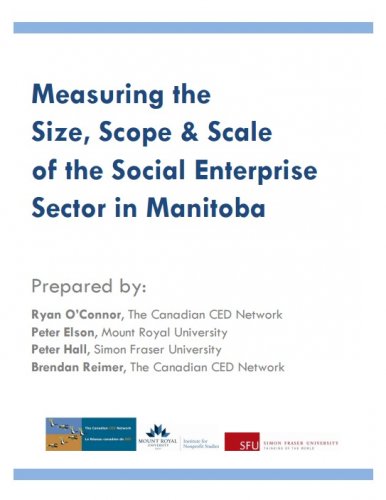This project surveyed social enterprises in Manitoba during the spring and summer of 2011 to develop clear indicators of their size, market activities, and socio‐economic contributions. In this study, a social enterprise is defined as a business venture, owned or operated by a non‐ profit organization that sells goods or provides services in the market to create a blended return on investment; financial, social, environmental, and cultural. Using this definition, researchers identified 266 operating social enterprises in Manitoba. Of the 266 social enterprises that received the survey, 118 responded. Indicators of socio‐economic contribution included sales and revenue, expenditures, employment, volunteer engagement, and clients served and trained. Respondents were asked to report results of the 2010 financial year.
Download the Full 2011 Manitoba Social Enterprise Sector Survey Report
Download the 2011 Survey Highlights
Prior to revealing the survey findings, this paper provides a brief history of the innovative approaches to community economic development that have been used in Manitoba. The province’s roots in community‐based economic models laid the foundation for Manitoba’s current social enterprises, which are found to be a diverse sector, composed of businesses meeting a range of poverty reduction, social, cultural or environmental goals.
This paper builds a strong case for stakeholders, community, funder, and government, to collaboratively value these distinct contributions and to support hospitable environments for social enterprises. This report is but the first of what is hoped to be a bi‐annual profile of social enterprises in Manitoba. As such, this report reveals some intriguing findings and other questions that will be addressed over time.
2011 Survey Findings at a Glance
The survey results suggest that in 2010, the 118 responding social enterprises generated at least $55.4 million in cumulative revenue, including at least $41.5 million generated through sales. Responding social enterprises paid at least $25.3 million in salaries and wages to 3,752 people, of whom 3,450 were employed as part of the mission of the organization. We estimate that Manitoba social enterprises paid, on average, just over $20,000 in wages and salary per full‐time equivalent employee. Additionally, social enterprises trained 6,890 individuals, generated 5,870 volunteer opportunities, and provided services to an average of 4,200 people.
Table of Contents
Introduction
Project Objectives and Limitations
Data Notes and Methodology
Creating the Catalogue
Process
Questionnaire
Data Treatment and Management
Outliers
A Brief History of the Social Economy in Manitoba
The Current State of Social Enterprises in Manitoba
Government Support
Community Support
Financial Support
Agents of Social Change
Analyzing Social Enterprises by Purpose
Demographics Served by Social Enterprises
The People Behind Social Enterprises
People Served – Employees, Trainees, Volunteers and Members
Social Enterprises Reducing Poverty
The Anatomy of the Sector
Location of Services
Location of Social Enterprises
Age of the Sector
Corporate Structure
The Economic Landscape of the Sector
Contributions to the Wider Economy
Market Activities
Financial Results
Financial Support
Profitable vs Not Profitable
Conclusion of Findings
Executive Summary
Measuring the Social Enterprise Sector in Manitoba
Appendix A: Location Maps
Appendix B: Provincial Comparatives – Alberta, British Columbia and Manitoba
Appendix C: Key Points of Comparison by Location
Appendix D: Key Points of Comparison by Purpose
Appendix E: Survey Questionnaire
Works Cited





